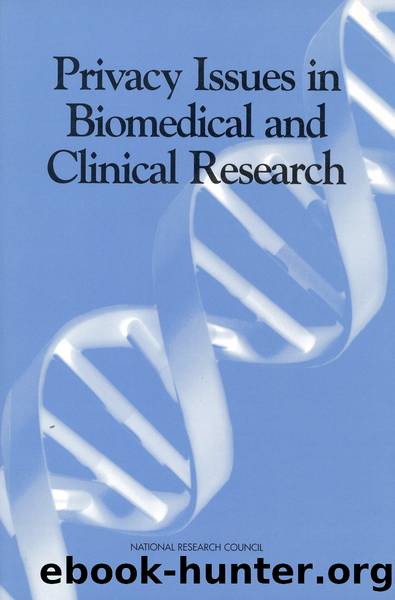Privacy Issues in Biomedical and Clinical Research by Board on Biology

Author:Board on Biology
Language: eng
Format: epub
Tags: Health and Medicine : Policy, Reviews and Evaluations
Publisher: NATIONAL ACADEMY PRESS
Published: 1998-11-10T00:00:00+00:00
What, if Anything, Should the Federal Government Do?
While the immediate impetus for the workshop was the worry that ill-considered federal legislation could harm genetic research, participants at the meeting were not necessarily asking that the federal government stay out of the issue altogether. Indeed, as Anne Phelps of the Senate Committee on Labor and Human Relations noted, "A lot of [Congressâs involvement] has been at the request of the research community and the genetics community. They came to Congress and said, âYou need to act.â" But act how? Much of the discussion at the workshop centered on the question of what the federal role should be.
Some participants, particularly Paul Billings, thought that the federal government should play little if any role, given current conditions, in the areas of genetic privacy and genetic discrimination in health insurance. Because health insurance is primarily regulated at the state level, Billings argued, the individual states have more experience and are better equipped to legislate. "I would suggest that federal legislation should only be directed at reducing the stranglehold that the ERISA exemption has had on the statesâ ability to legislate in areas of genetic discrimination, and to ERISA, the Employees Retirement Income Security Act of 1974, imposed federal regulation on insurance plans offered by companies to their employees and thus preempted much of what states can do to oversee such medical coverage. Congress should return to the states much of their traditional ability to regulate health insurance, including issues of genetic discrimination, Billings said. Otherwise, it should stay out of the area for now, "except to rectify gross inequities of state legislation."
Billings said that if states were given this power they would be unlikely to pass legislation that would harm research. There has been no negative impact arising from the genetic discrimination legislation that was passed in California on the conduct of clinical or basic science in that state."
Other researchers disagreed, however. David Foster of Genzyme Corporation in Cambridge, Massachusetts, described how the Massachusetts legislature was close to passing a law that would have crippled certain types of research in the state. "They have been at this [writing genetic discrimination legislation] for two years, and now that some of our key research folks, like Massachusetts General Hospital, are starting to review legislation which is actually ready for passage, they have discovered that it would shut us down. When the research folks look at this and think it through, they are dumb founded. They cannot believe that state legislatures would pass certain things that would really prohibit a lot of the research that we take for granted today."
As observed by Eleanor Kerr of SmithKline Beecham, "it is a mixed bag out there." California legislators may have done their homework and produced a reasonable law, but other legislatures have not. "The danger here is that without federal legislation states are racing ahead. You saw a list of ten bills in Congress. There are literally hundreds on the state level. I think about twenty states have now passed statutes.
Download
This site does not store any files on its server. We only index and link to content provided by other sites. Please contact the content providers to delete copyright contents if any and email us, we'll remove relevant links or contents immediately.
L Equipe NP by 22793(896)
Application of a Novel Technique for Clinical Evaluation of Nitric Oxide-Induced Free Radical Reactions in ICU Patients by Unknown(740)
Rosenâs Emergency Medicine Concepts and Clinical Practice by Ron Walls; Robert Hockberger; Marianne Gausche-Hill; Timothy B. Erickson; Susan R. Wilcox(603)
Constructing Canine Consent; Conceptualising and Adopting a Consent-focused Relationship with Dogs by ERIN JONES(472)
Oxidative damage to surfactant protein D in pulmonary diseases by Vitality Starosta1 & Matthias Griese1†(447)
Social Science Perspectives on Global Public Health by Vincent La Placa & Julia Morgan(417)
Chassin's Operative Strategy in General Surgery: An Expositive Atlas by Carol E. H. Scott-Conner Andreas M. Kaiser Ninh T. Nguyen Umut Sarpel Sonia L. Sugg(409)
ADVANCED EMERGENCY CARE AND TRANSPORTATION OF THE SICK AND INJURED by Unknown(357)
Irwin and Rippeâs Intensive Care Medicine by Unknown(353)
Organic Chemistry: An Acid - Base Approach by MICHAEL SMITH(339)
Diagnostic and Statistical Manual of Mental Disorders, Fifth Edition, Text Revision (DSM-5-TR(tm)) by Unknown(323)
Access to Medicines and Vaccines in the South : Coherence of Rules and Policies Applied by the European Union Commission by Stephen Kingah(313)
Saunders Nursing Drug Handbook 2024 - E-Book by Unknown(305)
Human Microanatomy; Cell Tissue and Organ Histology with Celebrity Medical Histories by Stephen A. Stricker(292)
Information Technology for Education, Science, and Technics by Unknown(292)
Davis's Comprehensive Manual of Laboratory and Diagnostic Tests with Nursing Implications by Unknown(290)
Socio-Life Science and the COVID-19 Outbreak : Public Health and Public Policy by Makoto Yano; Fumihiko Matsuda; Anavaj Sakuntabhai; Shigeru Hirota(284)
Berne and Levy Physiology E-Book by Unknown(269)
Replacing the Dead by Mie Nakachi;(267)
